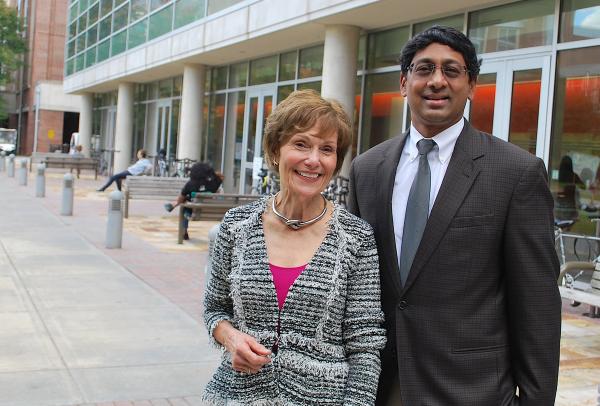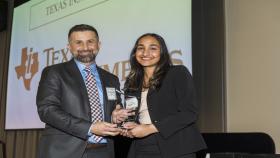Once upon a time, Marilyn Marks worked at the Georgia Institute of Technology, within the Economic Development Institute. Eventually, she left that job and went to work somewhere else, a typical career arc – things change, we move on, we work.
That was more than 20 years ago. But in many ways, she never really left Georgia Tech, and the university never lost its grip on her heart and soul.
Inspired by the work of researchers in Tech’s bio-community, especially those affiliated with the Wallace H. Coulter Department of Biomedical Engineering (BME), she gave what she could to the university through the years. Her $25 gifts became $100 gifts, and so on. And recently, Marilyn solidified her lasting relationship with Tech, establishing a scholarship that will support non-traditional BME students.
“BME is doing work that will benefit you personally or someone you know,” Marks says. “Basically, they’re doing work that will let loved ones remain vital, and stay alive as long as they live.”
That has become a theme for her life, that notion of being fully alive. In fact, Marks wants the evidence of that on her tombstone (in some far-off future): “While alive, she lived.”
“Of course, that isn’t original with me, but my goodness, what a thought,” she says. “Georgia Tech and BME will last well past my lifetime, and it could have a lasting impact on my children and grandchildren. It’s that important to me.”
Marks came to her realization through hard and heartfelt personal experience. She lost her husband, Ron, to lung cancer almost 10 years ago. Her sister also lost a battle with cancer. Both Marilyn and Ron provided care to their parents late in life, and to Marilyn’s sister. So, she’s seen the toll that an illness can take.
Together with Ron, she made a commitment, “to support areas that can impact a person’s health, quality of life, and longevity. Whether we’re talking about a child with a brain tumor or an octogenarian, you deserve a wonderful quality of life. And whether that means better ways of prevention, intervention, or even treatment of a terminal illness, I want to support that. It’s ingrained in me.”
She’d been collecting articles about research at Georgia Tech and was particularly interested in what was happening in the bio-community. She started giving, a little here, a little there, whatever she could afford. That’s a message she’d like to spread. “It’s a journey,” she says. “Give what you can while you’re alive, while you can decide what is important to you.”
One of the things that has always been important to Marks is the concept of “lifelong learning,” the idea that there isn’t, or shouldn’t be, a strict timeline to learning. This also was culled from personal experience.
Her parents moved to this country from Poland in the 1920s, first to New York, then to Atlanta, where they operated a grocery store. Her parents never stopped learning. Her mother knew six languages.
Later on, after Ron retired from a career in advertising, he took college courses for the sheer joy of learning. And Marilyn refers to herself as, “a recycled student. I didn’t get my graduate degree until I’d started working full-time. I understand the concept of having to work to go to school. Some students have to help support their parents, or simply can’t afford college right after high school, and some just aren’t ready for college at 17 or 18.”
So, her gift of $150,000 will support BME undergraduate students who aren’t coming directly from high school, or students who are returning to college. In other words, Marks is helping to fill an important gap in the life of a potential world-changing researcher.
“We are fortunate to count Marilyn Marks amongst our friends,” says Ravi Bellamkonda, who chairs the Coulter Department, a collaborative department of Georgia Tech and Emory. “She has an infectious enthusiasm, and the gift of being a generous of spirit, lifting up everything she touches. Her gift will have a great impact in making BME more accessible to our students.”
BME strives to attract the best, motivated minds, independent of financial status, according to Bellamkonda, who believes that Marks’ generosity helps the department take a step in that direction.
“These are often the forgotten students,” Marks says. “They should not be overlooked. Just think of the lost potential! These are students who some day could make a huge difference in the lives of others.”
Jerry Grillo
Communications Officer II
Parker H. Petit Institute for
Bioengineering and Bioscience
Walter Rich
Communications Manager
Wallace H. Coulter Department of Biomedical Engineering
Georgia Institute of Technology
Media Contact
Walter Rich
Communications Manager
Wallace H. Coulter Department of Biomedical Engineering
Georgia Institute of Technology
Keywords
Latest BME News
Jo honored for his impact on science and mentorship
The department rises to the top in biomedical engineering programs for undergraduate education.
Commercialization program in Coulter BME announces project teams who will receive support to get their research to market.
Courses in the Wallace H. Coulter Department of Biomedical Engineering are being reformatted to incorporate AI and machine learning so students are prepared for a data-driven biotech sector.
Influenced by her mother's journey in engineering, Sriya Surapaneni hopes to inspire other young women in the field.
Coulter BME Professor Earns Tenure, Eyes Future of Innovation in Health and Medicine
The grant will fund the development of cutting-edge technology that could detect colorectal cancer through a simple breath test
The surgical support device landed Coulter BME its 4th consecutive win for the College of Engineering competition.








